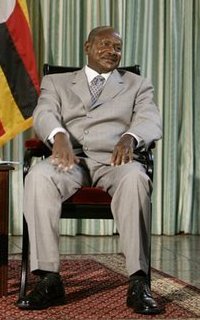 Image via Wikipedia
Image via Wikipedia
There have been conflicting reports regarding the nature of the incident. One of Nairobi’s heavyweight newspapers narrating eyewitness accounts cited that a box in the possession of three men who were hastily attempting to evade security screening exploded after it was dropped at the bus station suddenly igniting a powerful and loud explosion that created pandemonium minutes before the bus was due to depart for Kampala, the capital of Uganda. However, Kenya’s Standard online newspaper, reported that only the assailant died after being admitted to Kenyatta National Hospital and that two others died while being attended to at M.P. Shah Hospital.
So far the attack has not been linked to any party and has not been ruled out as a terrorist attack. The three East African nations of Kenya, Uganda, and Tanzania have in the past suffered acts of revenge coordinated by al-Qaida, an internationally-known constructivist/idealist non-state actor that is at war with the forces of Western liberal democracy.
In 1998, the simultaneous bombing of the cities of Nairobi and Dar es Salaam caused devastations of historical proportions after hundreds of civilians were killed and thousands injured in what leaders of al-Qaida described as global jihad efforts aimed at reining the forces of infidelity. In 2002, an attack on Kikambala Hotel, a luxury tourist resort in Mombasa, Kenya, left a dozen people dead and many others injured.
After a brief reprieve from acts of intimidation, the world awoke to another simultaneous attack in July 2010, this time in Uganda, after suicide bombers targeted an Ethiopian restaurant and another venue where peple had gathered around TV screens to watch a world soccer match. Both targets were located in the heart of Kampala. The double coordinated blasts instantly killed 74 revelers. Al-Shabab, Somalia’s armed Islamist faction that is battling the Transitional Federal Government (TFG) in Mogadishu, claimed responsibility for the Uganda bombing. Uganda has a large contingent of its armed forces in Mogadishu providing protection to the TFG and battling al-Shabab.
Part of a fleet of luxury liners operated from and owned in Uganda, Kampala Coach is often frequented by students who are attracted to the expediency and quick service it provides. Uganda has recently seen an upsurge of foreign students mainly from neighboring countries because of the quality education provided by its advanced educational institutions. Students from neighboring states and the great lakes region and especially those from the East African Community take advantage of the lower tuition rates and the state-of-the-art education and cheap standards of living available only in Uganda. Today’s Uganda would rather solicit funding for road construction than for educational purposes.
Post-independence Uganda was the envy of many sub-Saharan countries because it enjoyed superior educational system inherited from the British colonial administration. The University of Makerere in Kampala was reputedly the best in Africa south of the Sahara until the abrupt rise of a military junta headed by Idi Amin Dada that briefly lasted from 1971 to 1979. The expulsion in 1972 of 60,000 Asians from Uganda by Idi Amin and his declaration of “economic war” that was aimed at the expropriation of properties owned by Asians and Europeans resulted in decline in education and the economy.
Leaders of Somalia’s armed factions, human rights groups, and residents of Mogadishu, the Somali Diaspora, and even Somali parliamentarians have voiced their objections an decried the indiscriminate shelling of civilian populations by Ugandan troops. Often, little is mentioned of the presence of the troops from Burundi in Mogadishu’s volatile environment probably because Uganda has stolen the show by providing the bulk of the required force.
Uganda’s strongman, Yoweri Museveni, recently showed up at Mogadishu International Airport unannounced. Local media reported that he conferred with his trusted commanders and also had secret discussions with President Sharif Ahmed, the man who is leading the onslaught against the insurgency. For now, until someone claims responsibility for yesterday’s bombing, we will never know the truth nor prophesy whether retaliatory measures will follow soon. But we certainly know many innocent civilians will be held accountable for crimes they never committed.


No comments:
Post a Comment